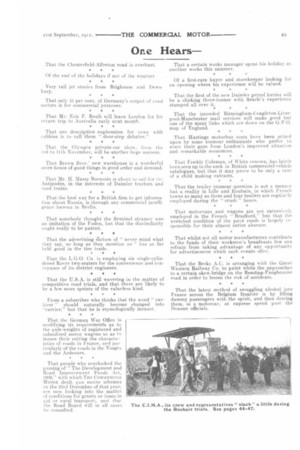One Hears—
Page 9

If you've noticed an error in this article please click here to report it so we can fix it.
That the Chesterfield-Alfreton road is overbust.
Of the end of the holidays if riot of the weather Very tall jet stories from Brighouse and Dewsbury.
That only 10 per cent. of Germany's output of road motors is for commercial purposes.
That Mr. Eric F. Boult will leave London for his return trip to Australia early next month.
That one descriptive euphemism for rows with cabbies is to call them " door-step debates."
That the Olympia private-car show, from the ard to 11th November, will be another huge suecess.
That Brown Bros.' new warehouse is a wonderful store-house of good things in good order and demand.
That Mr. II. Massy Burnside is about to -Jail for tip. Antipodes, in the interests of Daimler tractors and road trains.
That the best way for a British firm to get information about Russia, is through any commercial intelligence bureau in Berlin.
That somebody thought the Sentinel steamer was an imitation of the Foden, but that the dissimilarity ought really to be patent.
That the advertising dictum of " never mind what they say, so long as they mention us ." has so far held good in the tire trade.
That the L.G.O. Co. is employing six single-cylintiered Rover two-seaters for the convenience and conveyance of its district engineers.
That the U.S.A. is still wavering in the matter of competitive road trials, and that there are likely to be a few more sprints of the valueless kind.
From a subscriber who thinks that the word " carhirer " should naturally become changed into "carrier," but that he is etymologically inexact..
That the German War Office is modifying its requirements as to the axle-weights of registered and subsidized. motor wagons so as to insure their suiting the characte, istics of roads in France, and par. ticularly of the roads in the Vosges and the Ardennes.
That people who overlooked the passing of " The Development and Road Improvement Funds Act, t009," with which THE COMMERCIAL MOTOR dealt qua motor schemes on the 23rd December of that year, are now looking into the matter of conditions for grants or loans in aid or rural transport, anti that the Road Board will in all cases be consulted. That a certain works manager spent his holiday at another works this summer.
Of a first-rate buyer and storekeeper looking for an opening where his experience will be valued.
That the first of the new Daintier petrol lorries will be a clinking three-tonner with Searle's experience stamped all over it.
That the intended Birmingham-Congleton-Liverpool-Manchester mail services will make good but one of the many links which are down on the G.P.O. map of England, That Hastings motorbus costs have been seized upon by some tramcar enthusiasts who prefer to avert their gaze from London's improved situation and remarkable economies.
That Freddy Coleman, of White renown, has lately been seen up to the neck in British commercial-vehicle catalogues, but that it may prove to be only a case of a child making extracts.
That the trailer tramcar question is not a menace but a reality in Lille and Roubaix, in which French towns as many as three and four trailers are regularly employed during the " crush " hours.
That motorvans and wagons are not extensively employed in the French " Bradford," but that the wretched condition of the pave roads is largely responsible for their almost entire absence.
That whilst not all motor manufacturers contribute to the funds of their workmen's beanfeasts few can refrain from taking advantage of any opportunity for advertisement which such events offer.
That the Berks A.C. is arranging with the Great Western Railway Co. to paint white the approaches to a certain skew-bridge on the Reading-Pangbourne road in order to lessen the risk of accidents.
That the latest method of smuggling alcohol into France across the Belgium frontier is by filling dummy passengers with the spirit, and then driving them, in a motorcar, at express speed past. the Douane officials.






















